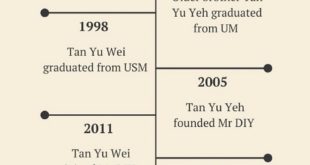
The Monetary Authority of Singapore (MAS) has confirmed that the country “will enter into a recession this year”, in a macroeconomic report released today.
This major economic downturn has been brought on by the impacts of the coronavirus outbreak.
Singapore’s economy already contracted 2.2 per cent year-on-year in the first three months, which makes it the first negative quarter since the global financial crisis in 2009.
With the closure of many businesses during the circuit breaker period, and Singapore’s trading partners being heavily affected as well, MAS warned that we should expect a sharper contraction in the second quarter.
Economic growth for the full year could even dip below the forecasted -4 to -1 per cent range, depending on how the situation develops.
If so, it would be the worst contraction the country has ever seen.
Singapore experienced its worst recession during the Asian Financial Crisis in 1998, which brought economic growth down by 2.2 per cent.
In 2001, the dotcom bust caused a contraction of 1.1 per cent.
And in 2009 amid the global financial crisis, Singapore’s economy still managed to make a growth of 0.1 per cent that year.
Length And Severity Of The Recession Is Still Uncertain
“At this juncture there remains significant uncertainty over the severity of the downturn, as well as the eventual recovery,” said MAS.
This is because Singapore’s outlook is dependent on external factors, like the transmission of the virus and how long it will take other countries to recover.
We do not know if the virus will taper off in the second half of 2020, and there may be risk of a subsequent wave of infections since a vaccine has not been found.
Due to these uncertainties, it will also be hard to predict the severity and duration of Singapore’s looming recession, as well as the strength of the recovery.
MAS added that due to the nature of the pandemic, containment measures can only be removed gradually.
“In fact, intermittent rounds of re-containment measures may be required, thus hampering a decisive rebound in economic activity,” the central bank said.
Three Risks To Singapore’s Economy
MAS highlighted a few significant downside risks that could affect Singapore.
Firstly, if stricter containment measures need to be deployed around the world, it would further constrain economic activities and result in worse-than-expected growth.
Secondly, resuming global economic activity could be delayed if the pandemic lasts longer than expected and persistently weak demand affects the timing of recovery.
Thirdly, the uncertainty around Covid-19, which is “more contagious but less detectable” than SARS, could delay consumer and business spending. This could mean a more gradual and less decisive global economic recovery.
If these three risks materialise in any combination, Singapore’s economic growth could fall below the current projected range, said MAS.
Decline In Labour Demand Across Most Sectors
Singapore’s job market will see strong impacts due to the recession.
Across the economy, companies may reduce their labour costs through wage cuts and headcount reductions, said MAS.
The hardest hit sectors like travel, hospitality, retail, transport, F&B and recreation, will be most likely to see layoffs.
Some of these sectors were already experiencing slow growth before the outbreak.
Firms that were already facing difficulties before the pandemic are the ones that are most likely to retrench workers.
However, the central bank said wages are overall more likely to be affected than jobs.
In order to help job seekers who have a harder time than ever looking for employment amid these challenging conditions, the Government has ramped up its efforts to create jobs.
It has launched the SGUnited Jobs scheme to create 10,000 new jobs by 2021.
Starting 1 June 2020, there will also be more than 4,000 job opportunities and traineeships available for fresh and recent graduates in Singapore.
Featured Image Credit: rawpixel.com via freepik



